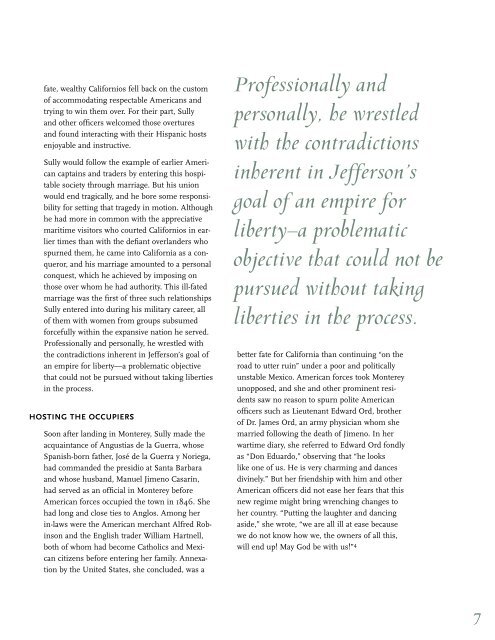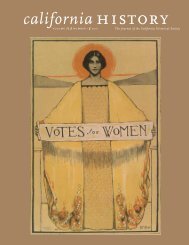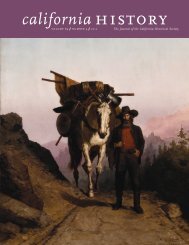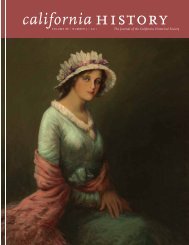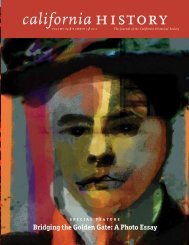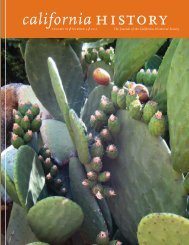Volume 90, Number 1 - California Historical Society
Volume 90, Number 1 - California Historical Society
Volume 90, Number 1 - California Historical Society
Create successful ePaper yourself
Turn your PDF publications into a flip-book with our unique Google optimized e-Paper software.
fate, wealthy Californios fell back on the custom<br />
of accommodating respectable Americans and<br />
trying to win them over. For their part, Sully<br />
and other officers welcomed those overtures<br />
and found interacting with their Hispanic hosts<br />
enjoyable and instructive.<br />
Sully would follow the example of earlier American<br />
captains and traders by entering this hospitable<br />
society through marriage. But his union<br />
would end tragically, and he bore some responsibility<br />
for setting that tragedy in motion. Although<br />
he had more in common with the appreciative<br />
maritime visitors who courted Californios in earlier<br />
times than with the defiant overlanders who<br />
spurned them, he came into <strong>California</strong> as a conqueror,<br />
and his marriage amounted to a personal<br />
conquest, which he achieved by imposing on<br />
those over whom he had authority. This ill-fated<br />
marriage was the first of three such relationships<br />
Sully entered into during his military career, all<br />
of them with women from groups subsumed<br />
forcefully within the expansive nation he served.<br />
Professionally and personally, he wrestled with<br />
the contradictions inherent in Jefferson’s goal of<br />
an empire for liberty—a problematic objective<br />
that could not be pursued without taking liberties<br />
in the process.<br />
hoSting the oCCupierS<br />
Soon after landing in Monterey, Sully made the<br />
acquaintance of Angustias de la Guerra, whose<br />
Spanish-born father, José de la Guerra y Noriega,<br />
had commanded the presidio at Santa Barbara<br />
and whose husband, Manuel Jimeno Casarín,<br />
had served as an official in Monterey before<br />
American forces occupied the town in 1846. She<br />
had long and close ties to Anglos. Among her<br />
in-laws were the American merchant Alfred Robinson<br />
and the English trader William Hartnell,<br />
both of whom had become Catholics and Mexican<br />
citizens before entering her family. Annexation<br />
by the United States, she concluded, was a<br />
Professionally and<br />
personally, he wrestled<br />
with the contradictions<br />
inherent in Jefferson’s<br />
goal of an empire for<br />
liberty—a problematic<br />
objective that could not be<br />
pursued without taking<br />
liberties in the process.<br />
better fate for <strong>California</strong> than continuing “on the<br />
road to utter ruin” under a poor and politically<br />
unstable Mexico. American forces took Monterey<br />
unopposed, and she and other prominent residents<br />
saw no reason to spurn polite American<br />
officers such as Lieutenant Edward Ord, brother<br />
of Dr. James Ord, an army physician whom she<br />
married following the death of Jimeno. In her<br />
wartime diary, she referred to Edward Ord fondly<br />
as “Don Eduardo,” observing that “he looks<br />
like one of us. He is very charming and dances<br />
divinely.” But her friendship with him and other<br />
American officers did not ease her fears that this<br />
new regime might bring wrenching changes to<br />
her country. “Putting the laughter and dancing<br />
aside,” she wrote, “we are all ill at ease because<br />
we do not know how we, the owners of all this,<br />
will end up! May God be with us!” 4<br />
7


